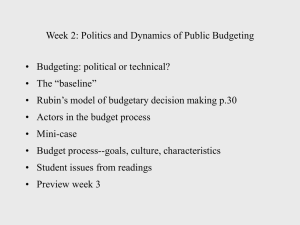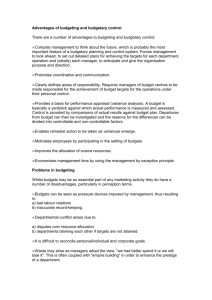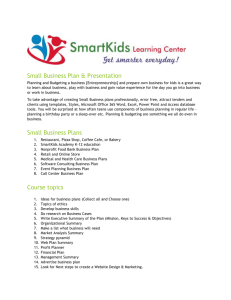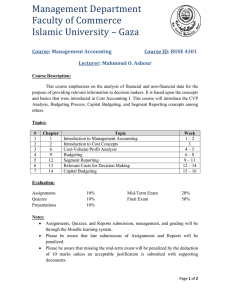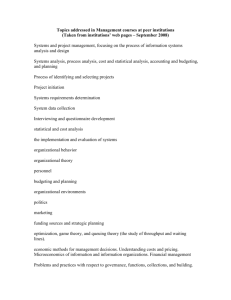PLSC 540- Public Budget Administration Fall 2014 Thursday 6-8:40 pm Livonia Campus
advertisement
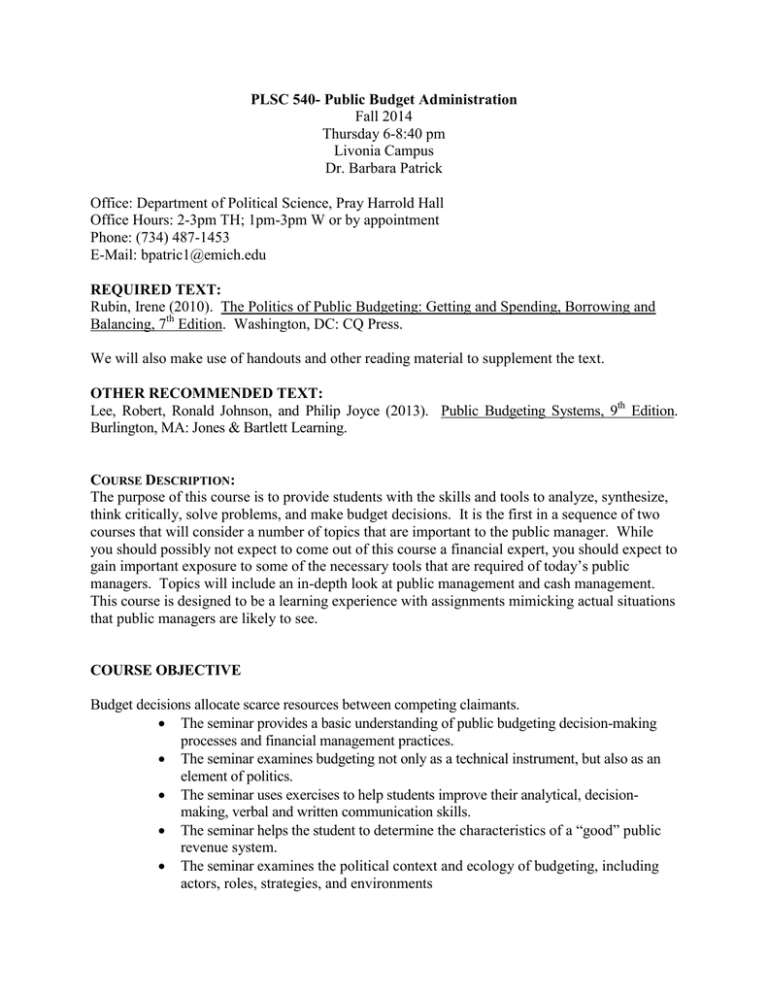
PLSC 540- Public Budget Administration Fall 2014 Thursday 6-8:40 pm Livonia Campus Dr. Barbara Patrick Office: Department of Political Science, Pray Harrold Hall Office Hours: 2-3pm TH; 1pm-3pm W or by appointment Phone: (734) 487-1453 E-Mail: bpatric1@emich.edu REQUIRED TEXT: Rubin, Irene (2010). The Politics of Public Budgeting: Getting and Spending, Borrowing and Balancing, 7th Edition. Washington, DC: CQ Press. We will also make use of handouts and other reading material to supplement the text. OTHER RECOMMENDED TEXT: Lee, Robert, Ronald Johnson, and Philip Joyce (2013). Public Budgeting Systems, 9th Edition. Burlington, MA: Jones & Bartlett Learning. COURSE DESCRIPTION: The purpose of this course is to provide students with the skills and tools to analyze, synthesize, think critically, solve problems, and make budget decisions. It is the first in a sequence of two courses that will consider a number of topics that are important to the public manager. While you should possibly not expect to come out of this course a financial expert, you should expect to gain important exposure to some of the necessary tools that are required of today’s public managers. Topics will include an in-depth look at public management and cash management. This course is designed to be a learning experience with assignments mimicking actual situations that public managers are likely to see. COURSE OBJECTIVE Budget decisions allocate scarce resources between competing claimants. The seminar provides a basic understanding of public budgeting decision-making processes and financial management practices. The seminar examines budgeting not only as a technical instrument, but also as an element of politics. The seminar uses exercises to help students improve their analytical, decisionmaking, verbal and written communication skills. The seminar helps the student to determine the characteristics of a “good” public revenue system. The seminar examines the political context and ecology of budgeting, including actors, roles, strategies, and environments Class Attendance and Etiquette: Class attendance is very important. You have 2 absences, after the second absence your grade will drop ½ a letter. Repetitive late arrivals will also result in an absence. If you arrive late or must leave early it is your responsibility to inform me; also it is very important that you arrive on time on exam days. If you arrive after the first student completing the exam has left the room, you will not be allowed to complete the exam. Make-up exams are only given with adequate documentation at the end of the semester. Class attendance on days that student present days is also very important. Failure to appear on present days without an excused absence will result in a grade deduction. Late arrivals on presentation days will also affect your presentation grade. GRADING SCALE: Budgetary Project and Presentation: 30% Class Participation and Assignments: 30% Midterm: 20% Final: 20% Homework & Class Assignments: Short problems will be assigned. Such assignments will be discussed thoroughly in class, and you may be called to present your answers in class. In addition, regular, effective, timely assignments/homework will be considered in some borderline cases. (E.g., if someone who otherwise has no demerits and who has done well on her homework tends to get the benefit of the doubt in a close call between, say, a B+ and an A-.) Class participation and Quizzes: It is expected that students will come to class prepared to discuss the assigned readings. Points will be awarded to those who intelligently participate in class discussions. This essentially means questions, observations, or argument that helps the general understanding of the class as a whole. These points must be earned, and will not be awarded automatically for speaking up in class. In the (unlikely, I hope,) event that it becomes apparent that insufficient numbers of the class have read the assigned material, quizzes will be administered. These will be graded and rolled into the more general grading scheme. Tests: The exam(s) will cover required readings and distributed items. Two exams will be given to include the final exam. All exams must be taken during the scheduled time. You are strongly encouraged not to miss a scheduled exam. If you miss an exam or other assignment, it is your responsibility to contact me as soon as possible to inform me of the situation. Make-ups will not be given without documented excuses, which I must approve. Budgetary Project and Presentation: You will be required to write an applied analysis on a topic related to this course. The topic is *NOT* to be policy but rather budget process. Newspapers or personal experience are great places to find such topics. In determining a topic, you should first choose a functional (or service delivery) area in which you have an interest, such as policing, homeless programs, DDAs, or various government departments like Parks and Recreation . Once you have decided on the functional area, you need to identify a government (like the City of Belleville or Highland County) or non-profit organization (NPO) that provides this function. Finally, you should pick a specific element of budgeting on which to focus. (Examples of budgeting elements are: internal controls; budget periodicity; data collection, and budget preparation.) Combining these three steps will allow you to arrive at a paper thesis. Examples of acceptable paper topics would be “The Effects of Off-line Budget Items on Fire Protection Spending and Policy” or “Cash Budgeting in the Ann Arbor Police Department” or “The Impacts of the Budget Preparation Time-Line on the Canton Township Recreation Budget.” In general, I expect the work to examine a budget process, not a policy. Specifically, tell me what happens and why as an entity attempts to reach a budgetary goal, not how to choose a goal nor what the goal “should be”. Papers will be at least 15 pages in length (12 point Times Roman or similar), doublespaced, excluding any graphics, bibliography, or appendices. That is, it will approach 5000 words in length. You will be expected to make a brief (fifteen minutes or less) presentation of your paper in class. (You are encouraged to make a PowerPoint presentation if this happens.) Proper APA format must be followed, including footnotes, cites, and bibliography. If you’re not absolutely positive that you’re using this style then look it up. For instance, do not use footnotes or endnotes for citations. Consult me or look on-line if you need help. COURSE OUTLINE: Week One (September 4, 2014) Introduction Week Two (September 11, 2014) Rubin Chapter 1: The Politics of Public Budgeting Week Three (September 18, 2014) Rubin, Ch. 2: Revenue Politics Lee, Johnson, and Joyce Ch. 6: Budgeting for Revenues: Transaction-Based Revenue Sources Week Four (September 25, 2014) Rubin, Ch. 3: The Politics of Protection Rubin, Ch. 4: The Dynamics of Changing Budget Processes Week Five (October 2, 2014) Rubin, Ch. 5: Expenditure: Strategies, Structure, and the Environment Lee, Johnson, and Joyce Ch. 7: Budget Preparation: The Expenditure Side Week Six (October 9, 2014) Rubin, Ch. 6: The Politics of Balancing the Budget Rubin, Ch. 7: Budget Execution: The Politics of Adaptation Week Seven (October 16, 2014) Midterm Exam Week Eight (October 23, 2014) Rubin, Ch. 8: Budget Implementation and Control Rubin, Ch. 9: Budgetary Decision Making and Politics Week Nine (October 30, 2014) Rubin, Ch. 8: Budget Implementation and Control Rubin, Ch. 9: Budgetary Decision Making and Politics Week Ten (November 6, 2014) Lee, Johnson, and Joyce Ch. 13: Capital Assets: Planning and Budgeting, Analysis, and Management Lee, Johnson, and Joyce Ch. 14: Capital Finance and Debt Management Week Eleven (November 13, 2014) Lee, Johnson, and Joyce Ch. 13: Capital Assets: Planning and Budgeting, Analysis, and Management Lee, Johnson, and Joyce Ch. 14: Capital Finance and Debt Management Week Twelve (November 20, 2014) Budget Presentations Week Thirteen (November 27, 2014) Thanksgiving Holiday-No Class Week Fourteen (December 4, 2014) Budget Presentations Week Fifteen (December 11, 2014) Final Exam The instructor reserves the right to amend the syllabus.
